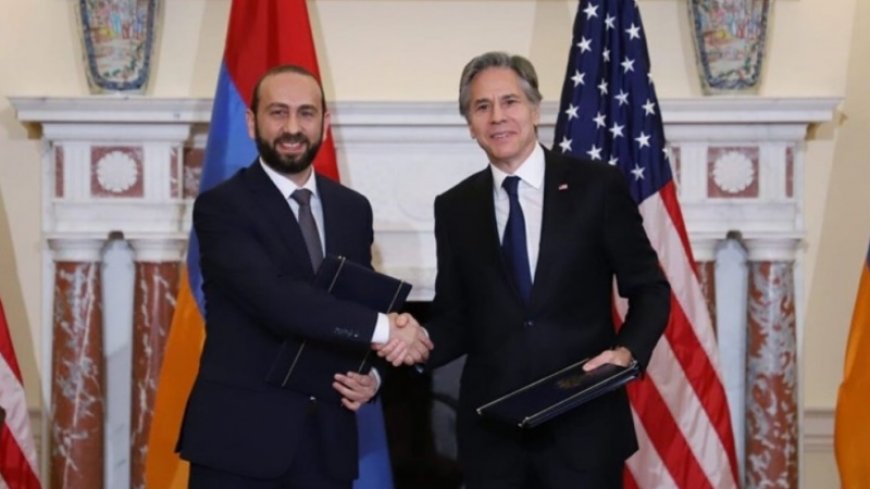Armenia-US Strategic Partnership: A Repeat of Georgia's Bitter Experience?
The signing of the "Strategic Partnership Charter" between the United States and Armenia has concerned Iran and Russia.

Experts warn of the negative consequences of this charter for Armenia and the region, given the failure of the US-Georgia strategic partnership program. Blinken announced the creation of a “Strategic Partnership Commission” to strengthen relations in various areas, from defense to economy and democracy.
He noted: “The United States cooperates with Armenia on security and defense issues and supports Yerevan’s efforts to establish independence and sovereignty on its territory.” Blinken stated: “We are becoming stronger partners, and this is in the interests not only of both countries, but also of the entire region, going beyond its borders.”
He added that the US is preparing to send a team of experts to Armenia to “provide expert assistance in strengthening border security,” adding that negotiations on civil nuclear cooperation are planned. Yerevan is also preparing to join the US-led international coalition fighting ISIS.
Blinken announced that the parties plan to continue cooperation in the security sector to strengthen “peacekeeping capabilities,” including conducting joint Eagle Partner exercises.
Armenia-US strategic partnership: reactions and possible consequences
Armenian Foreign Minister Ararat Mirzoyan expressed satisfaction with the signing of the “Strategic Partnership Charter” between the US and Armenia, adding that it creates a solid foundation for more ambitious cooperation between the two countries. As for why Mirzoyan expresses hope and not confidence on this issue, it probably needs no explanation.
In any case, as analysts note, the Biden administration’s interest in Yerevan led to this “strategic partnership.” And what will be the reaction of countries like Iran and Russia?
It is worth recalling that on the eve of the signing of the charter, Russian and CSTO officials emphasized “Armenia’s sovereign right to develop relations with all countries,” “the importance of cooperation within the EAEU,” “resolving problems with neighboring countries without asking the EU and the US for help,” and “maintaining the principle of equal and indivisible security,” which means “not creating a security threat to other countries and international organizations.”
Before the signing of the charter, a group of Armenian experts stated that the US would not provide Armenia with security guarantees or military assistance, as well as sell weapons and ammunition as assistance,” and the document does not envisage the establishment of a US military base in Armenia or the deployment of military representatives.
Armenian Economy Minister Georg Papoyan stated: “Armenia is not thinking about replacing the EAEU with another structure and is only seeking to diversify its trade partners.”
Speaking in a similar complex language to Nikol Pashniyan, he said: “We want to be independent, and independence means being dependent on everyone, not on one institution, and for everyone to be dependent on you to some extent.”
On January 9, Secretary of the Supreme National Security Council of Iran, Ali Akbar Ahmadian, emphasized during a meeting with the Prime Minister of Armenia: “The presence of extra-regional and external forces increases the complexity of the political and security equations of the region and will not help solve the problems, and the establishment of peace and stability is possible only with the help and cooperation of the countries of the region.”
The reactions of the countries of the region to the Armenia-US strategic partnership have been varied. Concerns have also been voiced regarding its consequences for regional security and stability.
Will Georgia's failed scenario be repeated in Armenia?
Armenian media enthusiastically covered the “strategic partnership” with the United States, but some circles recalled the signing of a similar document between the United States and Georgia in 2009, which failed.
The text of the document signed between the United States and Georgia included “plans for cooperation in the defense and security sectors, aiming to contribute to peace and stability.” It was also noted that the cooperation and partnership between the United States and Georgia in the defense and security sectors is beneficial for both countries and the region.
In addition, in 2016, the two countries signed a memorandum of understanding “on expanding cooperation in the defense and security sector.” Three years later, Georgia and the United States signed a three-year framework agreement on security cooperation, which was extended for 10 years in 2022.
However, in 2024, the “People’s Power” social movement in Georgia declared that “strategic partnership is just words,” and 90 percent of US aid is directed through fake public organizations to parties and organizations that “try to create bipolarity in the country, aim to destroy state institutions, restore foreign influence, and spread liberal ideology in Georgia.” In
the same year, after the adoption of the “Foreign Influence Transparency Act” in Georgia, the US reviewed relations with that country and announced that it would suspend $95 million in aid to Tbilisi. Then the US State Department announced the termination of the “Strategic Partnership” with Georgia.
The strategic partnership between Armenia and the US could also fail, as in the case of Georgia, and increase tension and instability in the region.













































